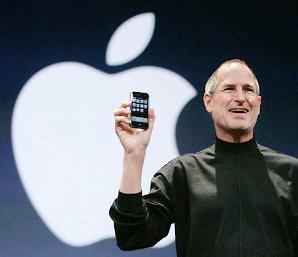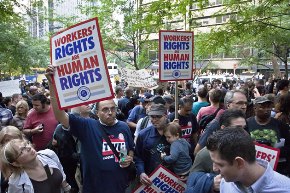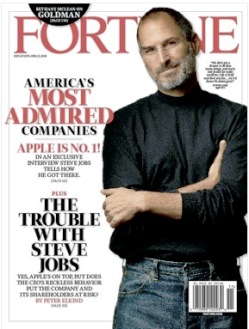
I’m not going to launch into an elaborate introduction about Steve Jobs’ death. You know it happened; you can consume facts and opinion about it, and share your own thoughts, here at Popdose and all over every communications medium around the globe. What I’m interested in, for the purpose of this column, is: Why have we invested so much (figuratively, though also literally) in this guy? And why does his loss resonate so deeply among us?
The easy answer is, because he made our lives better. Here was a guy who basically invented personal computing as we know it, then 15 years later transformed the way we listen to music — and then, within a decade after that, gave us a pair of devices whose functions expand infinitely upon those two previous innovations, and whose implications we’re only beginning to figure out. (Of course, he also practically invented “planned obsolescence,” but that’s another story.)
 OK, simple enough. But some questions remain: Why have we attached such importance to the loss of this one individual, when we know that Apple will continue as a multinational conglomerate that dominates the field of hand-held communication and personal entertainment? Why, at a time when Americans’ default position is to suspect the worst of practically every prominent institution and powerful person, do we lionize Jobs to the degree that we do? And why does the timing of his death only seem to magnify the profound meaning of his life?
OK, simple enough. But some questions remain: Why have we attached such importance to the loss of this one individual, when we know that Apple will continue as a multinational conglomerate that dominates the field of hand-held communication and personal entertainment? Why, at a time when Americans’ default position is to suspect the worst of practically every prominent institution and powerful person, do we lionize Jobs to the degree that we do? And why does the timing of his death only seem to magnify the profound meaning of his life?
The cynical, yet indubitably correct, answer to the first two questions is: marketing. Steve Jobs was Apple, in the public’s mind — and that’s precisely the way he and Apple’s marketers planned it, over more than a quarter century of invention, manufacturing and selling. Intuitively, we all know that Jobs didn’t spend his days donning that white spacesuit folks wear when they head into the clean room to play around with computer chips. Yet, thanks in large part to a cadre of marketing geniuses (and his willingness to attach his own face and reputation to his products), he will go down in history with the greatest of American inventors, with Benjamin Franklin and Eli Whitney and Thomas Edison and Henry Ford. Nobody knows the names of the R&D guys at Sony who invented the Walkman or the Trinitron; Bill Gates, household name though he is, has an altogether more complicated legacy. But Jobs will live on in our hearts, as well as our earbuds.
 As for that third question … I find it profoundly interesting that at the moment of Jobs’ death, the news media are abuzz over a nascent movement that is calling into serious question the efficacy, and indeed the morality, of American business. Sure, Occupy Wall Street is primarily about the banks and bankers who have enriched themselves through risky and fraudulent ventures while bringing the economy to the brink of ruin. And it’s about the politicians who have allowed this to happen, through deregulation and fiscal policies that for three decades have benefited the few at the expense of the many.
As for that third question … I find it profoundly interesting that at the moment of Jobs’ death, the news media are abuzz over a nascent movement that is calling into serious question the efficacy, and indeed the morality, of American business. Sure, Occupy Wall Street is primarily about the banks and bankers who have enriched themselves through risky and fraudulent ventures while bringing the economy to the brink of ruin. And it’s about the politicians who have allowed this to happen, through deregulation and fiscal policies that for three decades have benefited the few at the expense of the many.
But it’s also about every large, faceless corporation that has spent the last decade downsizing, moving jobs overseas, slashing worker benefits, and otherwise gearing its operations to enrich shareholders and top executives rather than to keep American employees working and thriving. It’s about every corporation that’s currently hoarding giant wads of cash that it should be investing in new plants and equipment, and new hires that might help get this nation’s economy moving rather than stagnating. It’s about overpaid CEOs whining about ”uncertainty,” which is code for ”we’re holding the economy hostage until somebody in Washington guts our industries’ regulations and guarantees our taxes won’t go up, ever.”
 Occupy Wall Street somehow doesn’t feel like it’s about Apple, though, and it isn’t about Steve Jobs. (It is about Gates and Microsoft, and our long memories of that company’s attempts to monopolize the market for operating systems and internet browsers, and otherwise thwart competition in the Silicon Valley.) No one has ever gained much traction painting Apple as a poster child for bad corporate behavior. We have tended to forget, or ignore, the fact that iPods and iPhones and iPads are made in China, just like so many other all-American products. We ignore the reports of terrible conditions at the factory that manufactures those gadgets — workers earning 51 cents an hour, even below normal Chinese standards, and guards carrying machine guns. Those conditions are so bad that last year more than a dozen workers took their own lives by jumping off the roof. (So many others attempted to do so that management strung netting between buildings to catch the jumpers.) Now the company is planning to put all those malcontents out of work … and move its plant to another part of China where employees will accept even less than 51 cents.
Occupy Wall Street somehow doesn’t feel like it’s about Apple, though, and it isn’t about Steve Jobs. (It is about Gates and Microsoft, and our long memories of that company’s attempts to monopolize the market for operating systems and internet browsers, and otherwise thwart competition in the Silicon Valley.) No one has ever gained much traction painting Apple as a poster child for bad corporate behavior. We have tended to forget, or ignore, the fact that iPods and iPhones and iPads are made in China, just like so many other all-American products. We ignore the reports of terrible conditions at the factory that manufactures those gadgets — workers earning 51 cents an hour, even below normal Chinese standards, and guards carrying machine guns. Those conditions are so bad that last year more than a dozen workers took their own lives by jumping off the roof. (So many others attempted to do so that management strung netting between buildings to catch the jumpers.) Now the company is planning to put all those malcontents out of work … and move its plant to another part of China where employees will accept even less than 51 cents.
We largely ignored Teamsters president James Hoffa, just last month, when he noted that Apple has been sitting on cash reserves of $76 billion while investing practically nothing in the U.S. (those sleek and absurdly busy stores in every major shopping mall notwithstanding). And we certainly didn’t begrudge Jobs his personal fortune of $6 billion or so, which will now be distributed by his estate — rather little of it to the government through “death taxes,” no doubt.
Somehow it seems painful, blasphemous, disrespectful of the dead, just to mention this stuff. Nevertheless, it’s all there in the public record. But we won’t pay much mind to it as we memorialize Steve Jobs in the coming days. Perhaps Apple’s long standing as the underdog in the computing industry, with sales lagging far behind PCs even as everybody acknowledged the higher quality of Apple’s products, inoculated the company against the ill will we’re happy to heap upon Microsoft. (Or upon Dell and Hewlett Packard, which share that Chinese factory complex with Apple.) Perhaps Jobs’ long and public illness gave him a halo that extended to his entire company.
 More likely, we’ll forgive Jobs his sins — heck, we don’t have to forgive them; we’ve rarely even noticed them — because he gave us what we want. Every year or so, we could count on him strolling out on a stage and introducing some new (or newly revamped) gadget that would become our national obsession, and that would conquer all competitors via its intuitive design and sheer ease of use. He did this better than anyone else ever has, really — and, more than we do with any other product on the market, we have associated our enjoyment of (and increasing reliance on) our Apple toys with Jobs himself. Because of him, Apple has not been a faceless corporation whose Up in the Air outsourcing we impugn or whose anonymous machinations we suspect; because we are so devoted to the products of his invention, we’ve never been inclined to look our (pricey) gifts in the mouth anyway.
More likely, we’ll forgive Jobs his sins — heck, we don’t have to forgive them; we’ve rarely even noticed them — because he gave us what we want. Every year or so, we could count on him strolling out on a stage and introducing some new (or newly revamped) gadget that would become our national obsession, and that would conquer all competitors via its intuitive design and sheer ease of use. He did this better than anyone else ever has, really — and, more than we do with any other product on the market, we have associated our enjoyment of (and increasing reliance on) our Apple toys with Jobs himself. Because of him, Apple has not been a faceless corporation whose Up in the Air outsourcing we impugn or whose anonymous machinations we suspect; because we are so devoted to the products of his invention, we’ve never been inclined to look our (pricey) gifts in the mouth anyway.
So what do we do with ourselves now? It’s somehow fitting that, the day before Jobs’ death, Apple executed a product rollout that seemed anticlimactic, if not disappointing. Who wants an iPhone 4S for Christmas when we all thought an iPhone 5 was coming? Perhaps Jobs might have put it across more effectively, if he rather than some other guy had strolled out onstage to introduce it Tuesday afternoon. But now that Jobs is gone, we have already begun to suspect that Apple’s innovation is bound to lag — and if our fears prove correct, perhaps the time will come to look into that Chinese factory and $76 billion bank account a bit more closely.
For now, though, rest in peace, Steve. From this day forward, I dedicate my every game of Angry Birds to your memory.




Comments